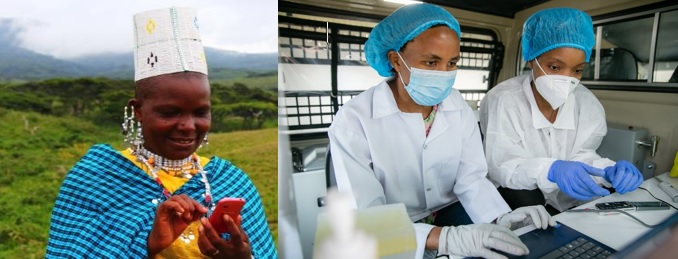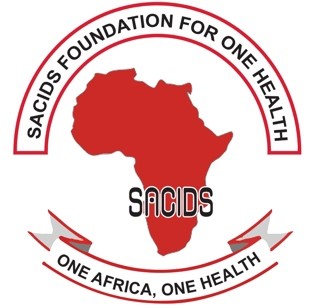As an inter-institutional virtual centre dealing with infectious diseases, SACIDS focuses on both individual and institutional development
The SACIDS Foundation for One Health (SACIDS) – formerly Southern African Centre for Infectious Disease Surveillance – is a Regional Research and Training Institute of Sokoine University of Agriculture on behalf of Membership. SACIDS was founded in January 2008: as a regional Southern African Centre for Infectious Disease Surveillance. Upon recommendation of its Governing Board, in 2018, it was transformed by the Council of Sokoine University of Agriculture (SUA) into the SACIDS Foundation for One Health, operating as a University research and training institute of the University on behalf of Member Institutions in Tanzania, Democratic Republic of the Congo, Mozambique and Zambia, with the South African National Institute for Communicable Diseases, The ARC Ondersterpoort Veterinary Institute and Universities of Pretoria Faculty of Veterinary Science and Stellenborsch Medical School as special African institutional partners and some University of London Colleges as external founding smart partner institutions.
The SACIDS Mission
To undertake cutting edge, transdisciplinary and multi-sectoral research that is impact orientated, prioritised and system based. This will be undertaken in Southern, Central and Eastern Africa, and where appropriate delivered through strategic partnerships with academia, research institutes, and international organisations.
The Vision
A Sub-Saharan African society protected from devastating infectious diseases affecting the health of humans, animals, i.e. both terrestrial and aquatic, and ecosystems, thereby promoting livelihoods, socio-economic development including market access and the environment.
Our focus on infectious Diseases, includes special attention to the study of anti-microbial resistance (AMR)

Monitoring infectious diseases and how SACIDS started
The genesis of SACIDS stems from the seminal global study by the UK Foresight Programme on the detection, identification and monitoring (DIM) of infectious disease of humans, animals and plants.
This study, which was conducted between 2004 and 2006, identified future (up to 2030) drivers of infectious disease risks (economic and climate change), future disease threats and future science technologies that will help to manage the risk of infectious diseases within the evolving societal context of culture, governance, economic trends and human practices.
The report of this study is entitled “Infectious Diseases: Preparing for the Future” (http://www.bis.gov.uk/foresight/our-work/projects/published-projects/infectious-diseases). This study included a specific strand and report for Africa, which was coordinated by 3 African scientists (http://www.bis.gov.uk/assets/foresight/docs/infectious-diseases/a1_id_africa.pdf).
How SACIDS works
SACIDS works with many groups, including supporters and donors. But our priority is long-term engagement with academic and research institutions. We are also specifically committed to working with communities and the public to create meaningful engagement. Our research strategy is driven by the focus on community level one Health security as a fundamental basis for national and global health security. Our operating core strategy involves working in defined themes in students, supervisors and researchers at all levels interact as members of a Community of Practice (CoP). Our internal expertise is enhanced through inclusion in each CoP external theme specialists from SACIDS partnerships.
Communities
In all our areas of work, we at SACIDS ensure to engage the communities and inform them of our works through meetings, workshops and outreach activities.
Government Ministries and Agencies
At the National Level, we work with Ministries and related agencies, including and Local Government Authorities (LGAs) responsible for human health, animal health within the environment of the African ecosystems. We also contribute to the Official National One Health Platforms in countries, like Tanzania, where such exist.
At the Regional Level, we collaborate with agencies of the Southern African Development Cooperation (SADC) and the East African Community (EAC).
At the Africa Continental Level, we collaborate with the Africa CDC and the Inter-African Bureau for Animal Resources (AU-IBAR) both of the African Union. For example, in the operationisation of the AfricaCDC frameworks for event based disease surveillance and for anti-microbial resistance and in the expert guidance of the development of the AU-IBAR Animal Health Strategy.
At all levels we participate either in participation in expert panels or provision of specific One Health expertise or provision of commissioned activities. For example, during the COVID-19, thanks to a grant from the Skoll Foundation to SACIDS, our scientists were able to provide diagnostic, epidemiological, surveillance, digital and genomics expertise to the national preparedness and response activities of the National Authorities in the DRC, Mozambique, Tanzania and Zambia https://www.openaccessgovernment.org/changing-epidemics-landscape/96422/.
Academic and Research Institutions
SACIDS was founded by universities and national research institutions that have active research and training programes in infectious diseases, including anti-microbial resistance. From the outset, it has operated as a joint enterprise by specialists from the human and animal health sectors.
In each participating country, the SACIDS Member institutions constitute the National SACIDS Chapter, formerly referred to as NatCIDS.
Therefore, we have access to network-wide institutional expertise, equipment and laboratories to ensure institutional capacity development.
Global Smart Partnerships
At the international level we work closely with our Founding Smart Partner Institutions from the University of London, namely the Royal Veterinary College (RVC), the London School of Hygiene and Tropical Medicine (LSHTM) and the London International Development Centre (LIDC) with its associated Colleges. The Pirbright Institute in the UK and The International Livestock Research Institute (ILRI) are founder smart partner research institutions with which we are deepening our collaboration. We are expanding our Smart Partnership network in order to tap into global expertise both in other regions of the South (e.g. in Brazil and South-east Asia) and in the “North” e.g. with Hokkaido University Centre for Zoonotic Diseases in Japan, the Sophia University, Tokyo, Japan, the VirginiaTech in USA and in Europe, especially Belgium, Sweden and Spain..
Africa Centres of Excellence for Infectious Diseases of Humans and Animals in Eastern and Southern Africa.
After eight years of progressive success, the SACIDS Member institutions in Zambia and Tanzania were successful forming two World Bank designated Africa Centres of Excellence (ACE), respectively at the University of Zambia and Sokoine University of Agriculture (partnering with Muhimbili University of Health and Allied Sciences and the Tanzania National Institute for Medical Research). The two ACEs are funded respectively by the Governments of Zambia and Tanzania, through the IDA facility of the World Bank. While the two ACEs are national entities, scientifically they form part of and key pillars of the SACIDS Foundation for One Health sharing the scrutiny and guidance by the SACIDS independent International Scientific Advisory Board and the SACIDS Governing Board.
Media
We realise how important the media in Africa is in catalysing positive change thus working them to inform the public and leaders, reaching areas that are often impenetrable and create inclusion in driving development. Our partnerships and alliances are important to our approach.
What we do
As a Membership Institution, SACIDS focuses on both individual and institutional development. This is in order to strengthen primarily SACD’s and thereby Africa’s capacity for addressing the infectious disease burden to society. And it does so by:
- Enhancing the collaboration between the human and animal health sectors into a common cause embodying One Health in the fight against infectious diseases, including the increasing phenomenon of anti-microbial resistance, an increasingly shared problem, bearing in mind that the majority of infectious diseases of humans originate from animals;
- Utilising the network-wide institutional resources, equipment and biosafety levels which gives the SADC region the capacity to be able to handle safely even the most dangerous infectious diseases known, such as Ebola, and therefore ability to diagnose such infections within the region;
- Linking Southern Africa’s institutions with those in the industrialized world as well as those in other developing region in an alliance for studying infectious diseases in the endemic settings of Africa;
- Developing and delivering targeted and internationally competitive continuing professional development programme courses and special MSc programmes in such specialized disciplines as Molecular Biology and Analytical Epidemiology;
- Offering research leadership career development apprenticeships in theme based Postdoctoral and PhD programmes
- Engaging an international panel of specialists from Southern Africa and the Smart Partner Institutions in course development, selection of the most promising young scientists and in co-supervision of research apprentices
- Developing a common consortium knowledge base and shared data/information
- Having a Secretariat and Virtual Graduate School that coordinated and monitors capacity development and research activities of the SACIDS Foundation for One Health



